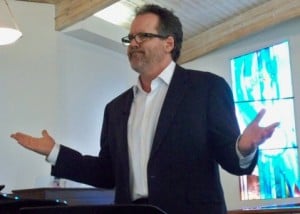 Sure, we all had some fun yesterday with the pictures I put up of me speaking. (Some of us you had a little too much fun.)
Sure, we all had some fun yesterday with the pictures I put up of me speaking. (Some of us you had a little too much fun.)
Oh, you jokesters, with your funny photo captions!
But about the talk itself.
Without question, I’m a Christian. I believe in the core stories of the gospel: that Jesus Christ was God incarnate; that he performed (what from our point of view we’d have to call) miracles; that as a means of providing for the irrevocable reconciliation of humankind to God he sacrificed himself on the cross; that he rose from the dead; that he left behind for the benefit of all people the totality of himself in the form of the indwelling Holy Spirit.
I’m very good with all of that. It’s been at the very center of my life and consciousness since the moment of my sudden conversion.
Christ and Christianity are meant to be understood, appreciated, and experienced as galvanizing inspirations for living a life of love, compassion, fairness, peace, and humility. Period.
I also believe that!
Hmm.
Here are a few random other things I … well, hold to be self-evident:
- The Bible is a collection of a great many separate documents written by different people in different languages over thousands of years. Properly understanding both the letter and spirit of the Bible necessarily entails taking into account the historical and culture contexts that so greatly informs so much of it its text. The size, density, history and complexity of the Bible render unfeasible the idea that not one of its words reflects more man’s will than God’s. The spirit of God is inerrant; people—even those impassioned by the conviction that God is speaking directly to or through them—are not. (For more, see my The Bible’s Two Big Problems.)
- Anyone seeking to mix church and state has failed to understand the nature and proper role of either. Being founded upon the principal that all men are created equal and deserving of equal protection under the law is what makes the American system of democracy such a gift to mankind. To incorporate the inherently exclusionary imperatives of a particular religion into the determinedly inclusive system of the American constitutional form of government would be to undermine the very spirit of America by pushing it away from a democracy, and toward a theocracy. (Does the Holy Spirit Vote Republican?)
- It’s not possible to read Paul’s New Testament writings and remained unmoved by his open heart, intellectual prowess, and staggering bravery. And yet Paul (whom, we should never forget, spent years zealously persecuting and having executed untold numbers of Christians) must remain to us a mortal man. More than reasonable, it is incumbent upon those who claim to seek the deepest knowledge of Christ to subject the words of Paul to the same kinds of objective analysis we would the words of any man daring to describe the qualities, purposes, and desires of God.
- With regards to the written identity of God, the pronoun “he” is a necessity of the English language, not an actual anatomical designation. God is neither male nor female; God is large enough to contain and hold in balance any of the qualities one might assign to either. (Does the Average Christian Reader Need God to be a “He”?)
- The Biblical scholarship supporting the idea that Paul never wrote a word proscribing natural homosexuality is at least as credible and persuasive as the scholarship (if not the typical translations) claiming that he did. Any person who uses the words of Paul in the New Testament to “prove” that homosexuality is a sin against God has either never themselves researched the matter, or has simply chosen to believe one set of equal proofs over another. Though laziness is easily enough understood, I remain mystified as to why anyone who purports to follow Jesus would choose to condemn an entire population over choosing to obey Jesus’ self-proclaimed Greatest Commandment to love one’s neighbor as one loves oneself. (Christians and LGBT.)
- It is much more reasonable—and certainly more compassionate—to hold that throughout history God chose to introduce himself in different ways into different culture streams, than it is to believe that there is only one correct way to understand and worship God, and that the punishment for anyone who chooses any but that way is to spend all of eternity having the living flesh seared off of his or her bones. (“God Can Love Me; God Can Send Me to Hell. But He Can’t Do Both.”)
- “No one comes to the Father except through me” does not mean that only Christians can get into heaven. It means that Jesus decides who does and doesn’t make the cut. (Jesus the Decider: Do Only Christians Get Into Heaven?)
- The question of whether or not hell is real is properly subsumed by the truth that a moment spent worrying if you’ll be with God in the afterlife is an opportunity missed to be with God in this life.
- God’s will and intention is to forgive and teach us, not judge and punish us. (Are We Already Fulfilling God’s “Plan” for Us?)
- The only person who should be actively endeavoring to convert non-Christians into Christians is God. Jesus does not need our help drawing people towards him. He does need our help—or could certainly use it, anyway—making sure that people know that they are, just as they are, loved. (What Non-Christians Want Christians to Hear.)
- Getting a divorce is painful—and if at all possible should certainly be avoided. But ultimately the act in and of itself is not immoral.
- God does not want any woman “submitting” to anyone. (If “Submit” Isn’t the Right Word for Christian Wives, What Is?, and 7 Reasons Women Stay in Abusive Relationships.)
- There were no dinosaurs on Noah’s ark; Jesus didn’t have a pet stegosaurus. Anyone who believes the earth is only 6,000 years old needs to start eating at the grown-up table. An all-powerful God and the theory of evolution are not incompatible.
- The single most telling indicator of a person’s moral character has nothing to do with how they define or worship God, and everything to do with how they treat others.
Not that I covered all that this past Sunday. But writing about all that sort of stuff is certainly much of what I do here on my blog. And because you guys read what I write—and share it with others, and link to it on your own blogs and Facebook profiles, and join my Facebook page, and so on—I am empowered to continue doing that work.
And to even sometimes dress up, venture out into the big, bad world, and do it in person.
So I thank you.












